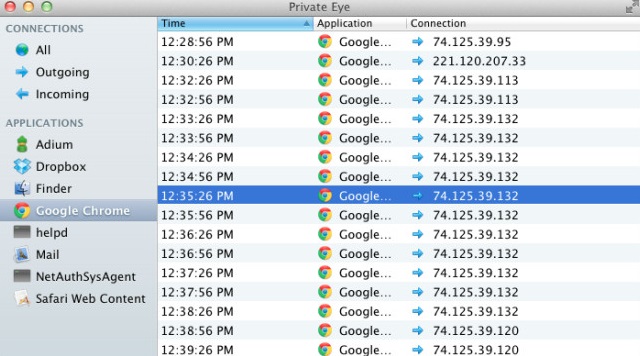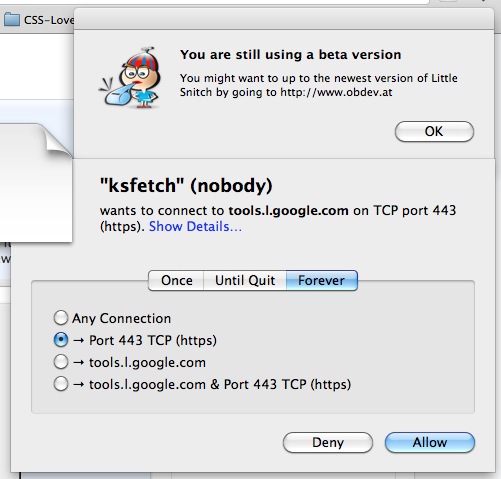Tcpblock Vs Little Snitch
How to block Little Snitch from calling home and killing numbers: 1. The first step is to block Little Snitch with Little Snitch. Create two new rules in Little Snitch as below. # Block Little Snitch. 127.0.0.1 obdev.at. And save it with Command+S. Close TextEdit, hit Command+Tab to return to the Terminal window, and paste in the.
Those of you who pay close attention to Little Snitch’s version numbering might have wondered why there’s no Little Snitch 3.2, but a Little Snitch 3.3.


- Apr 05, 2012 Little Snitch, Hands Off!, TCPBlock. Discussion in 'other firewalls' started by blasev, Apr 5, 2012. Hi all recently I notice that many other firewall solution for mac besides little snitch has anyone use Hands Off!? I also need expert opinion on TCPBlock firewall. Thanks in advance. Blasev, Apr 5, 2012 #1. Thread Status.
- Aug 29, 2016 yep. Little snitch here too. As always, if u need to monitor suspicious outbound connections, my advice always,is you have more problems than just blocking something. Otherwise, good for general troubleshooting. I used Little snitch in the past, but i know what happens on my machines always, so if something gets on there, i'll know about.
If you payed really close attention over the last few months, you might even wonder why there were a total of six Little Snitch 3.2 nightly builds (a.k.a. beta versions), but no Little Snitch 3.2 final release. (The release notes for these nightly builds even mentioned fixes related to OS X Mavericks!)
So why did we jump from Little Snitch 3.1.3 straight to Little Snitch 3.3?
The answer to these questions is pretty simple: Apple made us do it.
They didn’t call and ask us to artificially inflate the version number or anything like that. It’s just that when you download and install the new OS X Mavericks from the App Store, it specifically checks for Little Snitch “version 3.2” and earlier during the upgrade. If the OS X installer finds such a version, it moves it to the “/Incompatible Software” folder and you get an alert telling you this version of Little Snitch won’t work on that version of OS X.
Tcpblock Vs Little Snitch Full
To work around this, we just had to increase the version number to anything higher than 3.2. Otherwise, Little Snitch would have stopped working when you upgraded from OS X Mountain Lion to OS X Mavericks.
This isn’t an attempt by Apple to block Little Snitch or anything like that – they could do things that are much more effective than that. Instead, this should be seen as Apple making sure no software that wasn’t tested against the newest OS X release can cause troubles. And isn’t that nice?
Tcpblock Vs Little Snitch Game
- How to block Little Snitch from calling home and killing numbers:
- 1. The first step is to block Little Snitch with Little Snitch. Create two new rules in Little Snitch as below:
- a) Deny connections to Server Hostname http://www.obdev.at in LS Configuration. The address that will appear if you do it correctly is 80.237.144.65. Save.
- and the next is:
- b) Deny connections in LS Config to the application Little Snitch UIAgent (navigate to /Library/Little Snitch/Little Snitch UIAgent.app, any server, any port.
- 2. After that is done, open the Terminal (in your Utilities) and paste in:
- sudo /Applications/TextEdit.app/Contents/MacOS/TextEdit /etc/hosts
- (Hit return and type in your admin password). A TextEdit window will open behind the Terminal window. Command+Tab to it - this is your hosts file.
- 3. Place your cursor at the end of the text there, type or leave one vertical space and paste in the following:
- # Block Little Snitch
- 4. Close TextEdit, hit Command+Tab to return to the Terminal window, and paste in the following:
- sudo dscacheutil -flushcache
- 5. Hit the Return key and quit Terminal. You're finished now.
- 6. Easy, isn't it. If only everyone would do this, the developer would cease and desist from killing the number that you personally are using successfully on your Mac. At least until the next version is released…